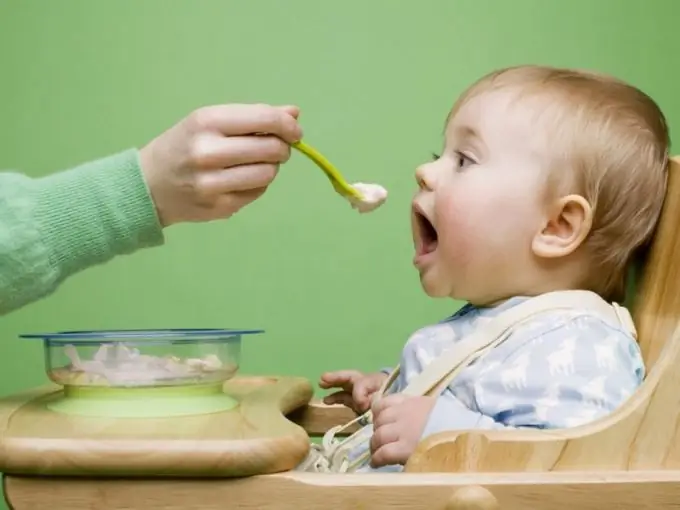- Author Horace Young young@householdfranchise.com.
- Public 2023-12-16 10:35.
- Last modified 2025-01-23 11:41.
With the start of complementary feeding, parents have a lot of questions about what to feed the baby and at what age. Sometimes moms and dads hesitate when to give a child puree from vegetables and fruits.

First feeding: when to give your baby vegetable puree
Just a few decades ago, the first complementary foods pediatricians recommended to start with were not vegetables. Acquaintance with new tastes began with juices, which were given almost after the first month of life. Today, the point of view of doctors has changed and it is believed that breast milk or adapted formulas fully meet all the needs of the baby's body, which makes it possible not to overload his digestive system with concentrated juices. Therefore, now they start complementary foods with vegetables, fruits or cereals.
Vegetable complementary foods are recommended for those children who have no problems with weight gain, since when there is a lack of it, cereals are added to the menu first. Puree from vegetables should be given no earlier than the child turns 4 months old, and for babies who are breastfed, this period can be safely postponed to six months. The first to choose the least allergenic vegetables, which include zucchini and broccoli or cauliflower.
You should not take all the recommendations for the introduction of certain vegetables literally, since only his mother and the attending physician, whose opinion about complementary feeding is based on knowledge of the health characteristics, can best know the baby's needs.
When to give your child fruit puree
In principle, you can start complementary foods with fruits. Apples and pears are great for this. But the difficulty lies in the fact that after the sweet taste of these fruits, not all children are happy to eat neutral zucchini or cabbage. As for the timing of acquaintance with fruits, they are similar to those reserved for vegetables, that is, before the child reaches 4 months, you can take your time. And, unlike vegetables, fruits are given in much smaller quantities, therefore it is much more convenient to give them not in pure form, but as an addition to other dishes, first to cereals, and then to cottage cheese.
For allergenic fruits such as citrus or red berries, even later dates are set for introduction into the diet and you should not rush with them up to six months, even if the child is not prone to allergies.
Shop or homemade puree: advantages and disadvantages
Many people believe that the quality of mashed potatoes prepared by the hands of a loving mother cannot be compared with the store-bought puree, because no one knows what really lies in the jars and how much all the technologies are followed. But it is not so. The production of baby food is tightly controlled and if you compare it with homemade food, then the latter can only lead if it is made from fruits grown in their own garden and cooked in the season of their growth. In winter, even their own apples lose most of their properties, so the advantage is on the side of factory production.






